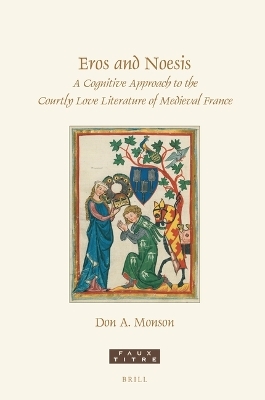
Eros and Noesis
Brill (Verlag)
978-90-04-50448-6 (ISBN)
This is the first study to apply the results of modern cognitive science to medieval love literature. Covering the entire corpus of Occitan, French and Latin love literature of twelfth- and thirteenth-century France, it explores the universal and the culturally specific in medieval poetic attitudes towards love, the cognitive structure of the love themes, and the cognitive basis for the system of courtly genres. It proposes a cognitive taxonomy of courtly literature based on three “hyper-genres”: the lyric as the basic mode for the expression of love, with courtly narrative and didactic literature arising through a process of amplification of the courtly themes. It also includes anti-courtly satire, which applies to courtly idealism an innate human propensity for detecting cheating.
Don A. Monson, (Ph.D., University of Chicago, 1974), is Professor Emeritus of the College of William and Mary. His major publications include Les “Ensenhamens” occitans: Essai de définition et de délimitation du genre (1981) and Andreas Capellanus, Scholasticism, and the Courtly Tradition (2005).
Acknowledgements
Abbreviations
Introduction
part 1: Love Problems: Courtly Literature, Genre Theory and Cognition
1 The Problem of “Courtly Love”: In Search of a New Paradigm
1 The Classic Theory (1880–1950)
2 Revisions and Contestations (1950–1985)
3 Poststructuralism and the New Medievalism (1985–the Present)
4 Generic and Cognitive Perspectives
2 Medieval Poetic Love: Biological Universality and Cultural Specificity
1 The Medieval Invention of Love?
2 Universality: The Biology of Love
3 The Environment of Adaptation: Courtly Culture
4 Medieval Intellectual Culture and Poetic Form: Rhetoric and Dialectic
5 Medieval Social Institutions and Poetic Substance: Feudalism and Christianity
3 Cognition and Genre Theory: The System of the Courtly Genres
1 Genre Theory and Courtly Literature
2 Courtly Lyric
3 Courtly Narrative
4 Courtly Didactic
5 The Courtly Genres as a System
4 The Psycho-dynamics of Love: Parsing the Courtly Themes
1 The Origins of Love
2 Obstacles to Love
3 Overcoming the Obstacles
4 Outcomes
Part 2: Love’s Discourse: A Cognitive Taxonomy of the Courtly Genres
5 Love Song: Courtly Themes in a Lyric Mode
1 Pure Lyricism: The canso and Some Derivative Genres
2 Songs of Male Boasting: The “Gap”
3 The Woman’s Voice: trobairitz and “chansons de femme”
4 Lyrico-narrative Genres: Pastourelle, Aube, Chanson de Toile
5 Lyrico-didactic Genres: tensos and partimens
6 Love Story: Courtly Themes in a Narrative Mode
1 From Song to Tale: Troubadour Biographies and Lyric Insertions
2 Short Verse Narrative: novas and lais
3 Romance: Tristan, Chrétien and Beyond
7 Love Lesson: Courtly Themes in a Didactic Mode
1 Vernacular Beginnings: The ensenhamens
2 The Ovidian Tradition: Latin and Vernacular Arts of Love
3 A Latin, Scholastic Synthesis: Andreas Capellanus
4 A Vernacular, Courtly Synthesis: Guillaume de Lorris
8 Love Mocked: Courtly Themes in a Satirical Mode
1 Lyric Satire: sirventés and “contre-textes”
2 Narrative Satire: burlesque lais and fabliaux
3 Didactic Satire: Debates and Diatribes
Conclusion
Bibliography
Index
| Erscheinungsdatum | 25.03.2022 |
|---|---|
| Reihe/Serie | Faux Titre ; 455 |
| Verlagsort | Leiden |
| Sprache | englisch |
| Maße | 155 x 235 mm |
| Gewicht | 742 g |
| Themenwelt | Geisteswissenschaften ► Archäologie |
| Geschichte ► Allgemeine Geschichte ► Mittelalter | |
| Geisteswissenschaften ► Sprach- / Literaturwissenschaft ► Anglistik / Amerikanistik | |
| Geisteswissenschaften ► Sprach- / Literaturwissenschaft ► Literaturwissenschaft | |
| ISBN-10 | 90-04-50448-6 / 9004504486 |
| ISBN-13 | 978-90-04-50448-6 / 9789004504486 |
| Zustand | Neuware |
| Haben Sie eine Frage zum Produkt? |
aus dem Bereich


